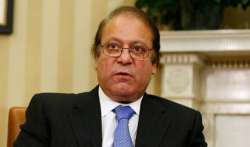Pakistan committed to work with SAARC countries to combat terror: Nawaz Sharif
Pakistani Prime Minister Nawaz Sharif today said that his country is committed to work with other SAARC member countries for fighting terrorism, corruption and organised crimes.

Pakistani Prime Minister Nawaz Sharif today said that his country is committed to work with other SAARC member countries for fighting terrorism, corruption and organised crimes.
Addressing the inaugural session of the SAARC Interior/ Home Ministers' Conference here, Sharif cited Pakistan's anti-terror operations in restive tribal areas and National Action Plan to emphasise "the government's determination to eliminate the scourge of terrorism from our soil for good."
He said the SAARC region is blessed with tremendous human and natural resources. "So, SAARC can and should provide a platform to optimally harness the regional potential for peace and prosperity of our people."
Sharif said such an approach is in sync with his government's vision of "peace for development and peaceful neighbourhood".
"Pakistan has always been supportive of initiatives taken by SAARC to advance its ideals and objectives as enshrined in its charter," he said.
He said Pakistan has also been strong advocate of stepping up regional efforts to ensure energy security through sharing of indigenous sources.
The Prime Minister said Pakistan shares the perception that connectivity is critical to the progress and prosperity of the region and supports, in principle, road, air, rail and water connectivity within the region.
"Realisation of the goals and objectives envisaged in SAARC charter is our collective responsibility," he said.
Addressing the inaugural session, SAARC Secretary General Arjun Bahadur Thapa said there is a need to take effective measures to tackle the menace of terrorism, narcotics, cybercrimes and other transnational crimes.
The day-long 7th meeting of the eight-member grouping is being held to review the progress on decisions taken in previous meetings.
SAARC comprises Afghanistan, Bangladesh, Bhutan, India, Maldives, Nepal, Pakistan and Sri Lanka.